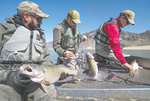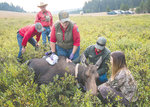Cloudy, 57° F
At a time that the State of Wyoming is struggling to find ways to shore up the budget, the Game and Fish Department continues to find ways to afford major expenditures, from construction …
This item is available in full to subscribers.
The Powell Tribune has expanded its online content. To continue reading, you will need to either log in to your subscriber account, or purchase a subscription.
If you are a current print subscriber, you can set up a free web account by clicking here.
If you already have a web account, but need to reset it, you can do so by clicking here.
If you would like to purchase a subscription click here.
Please log in to continue |
|


At a time that the State of Wyoming is struggling to find ways to shore up the budget, the Game and Fish Department continues to find ways to afford major expenditures, from construction projects to the ever-increasing costs of conservation.
Every state department has been asked to find ways to save as Wyoming struggles financially. However, the Game and Fish is largely funded by sportsmen, previously being all but cut off from state general fund support, so there is little the agency can do to help the state’s bottom line.
For the 2021 budget, the department has given back $800,000 that it normally received from the state to compensate for free and reduced price licenses. It represents less than 1% of the department’s $88.5 million in annual revenues, but is one of the only items the department can cut to help the state, said Game and Fish Deputy Director John Kennedy.
“If you think about where our budget reductions can actually help the state in terms of the general fund, all of our other revenue and budget capacity that we have right now has to be spent on wildlife and is controlled by the department,” Kennedy said. “So any budget reductions won’t help to address the state’s economic problems and the state’s budget ...”
Only the Legislature can increase the price of licenses and fees, so the department is forced to live within the constraints of current prices. The only way it can increase revenue is by selling more products. Across the country, fishing and hunting is in decline, but not so in Wyoming. For the 2021 budget, the department has been able to both pay for major projects and save cash for future emergencies.
In previous years, the department requested general funds to help pay for capital construction — like the expansion of its Cheyenne headquarters and the replacement of other regional offices. The department now plans to complete these projects without requesting general funds. For example, the budget includes more than $5 million from the Game and Fish Commission to construct a new regional headquarters in Cody.
The department has also increased its reserves by a month; the Game and Fish Commission Reserve Account now holds $38.7 million, enough to cover seven months of operating costs.
The commission’s annual revenue is approximately $88.5 million. This includes money from hunting and fishing licenses, conservation stamps, preference points, boat registration and federal aid. The majority of the annual revenue, $75.7 million or 85%, comes from hunters, anglers, recreational shooters and boaters. Regulations associated with this funding forbid revenues from being diverted to purposes other than the administration of the Game and Fish and wildlife management.
The breakdown of revenue is surprising. The department brings in about $56.3 million in licenses and fees and 77% of that comes from non-residents. At first glance, the large amount of licenses and fees generated from nonresidents could lead to the misconception that the state is being flooded by out-of-state hunters and fishermen. But one statistic that stands out is the money collected for preference points.
Non-resident hunters invest more than $12 million in preference points each year, while residents put a little more than $100,000 into future hunts. While residents only need preference points for moose and bighorn sheep, non-residents also need them for elk, deer and pronghorn.
The percentage of non-residents receiving licenses differs for each species, but in most cases it’s less than 20% of the available hunting licenses, said Sara DiRienzo, public information officer for the Game and Fish.
One of the statistics the department uses to measure success is hunter and angler recreation days. The department beat its goals with more than 1.24 million hunter recreation days and 2.71 million angler recreation days in 2020. Hunter days increased approximately 3.6% between fiscal years 2019 and 2020. Almost all categories of hunted animals had increases in recreation days, while only furbearer days decreased, according to the department’s annual report.
“This reflects the general trend in interest in hunting in Wyoming based on license sales recently,” the report says.
While revenue is brought in by outdoor sports and taxes from the sales of hunting and fishing equipment, Kennedy is quick to point out all of the state’s conservation efforts are paid for with the same revenue.
“Right now we feel comfortable with our revenues,” he said. “But things get more expensive every year. That’s one of the reasons why we are trying to manage the commission’s budget, so that we have the capacity in there to address some unanticipated expenses.”
Some of the highest priorities include wildlife crossings and highway projects, battling aquatic invasive species and conservation efforts for endangered and threatened species.
“Those are multi-million dollar projects,” Kennedy said. “The price tag for those are just, you know, off the chart.”
There is some hope that this year’s run on sporting goods — including guns and fishing equipment — will result in more money from federal tax revenue sources, but it may be a short-term windfall.
“We don’t know how long that’s going to last,” Kennedy said. “We have been receiving unprecedented levels of monies from the sale of firearms and ammunition during the last few years — this year included.”
“We anticipate that to continue for at least two more years. But after that, we have no idea,” he said.
The last time the Legislature increased licensing prices was 2018, after cutting the department off from the general fund. The department is not currently looking at any initiatives to increase those fees during the 2021 session, Kennedy said. The department previously received millions in support from the state, though the funding represented less than 10% of its budget.